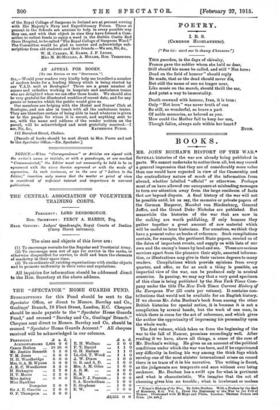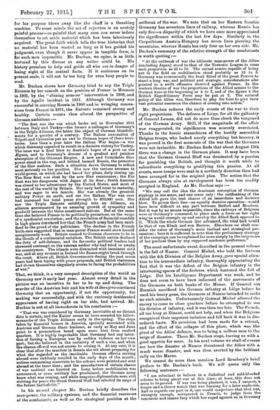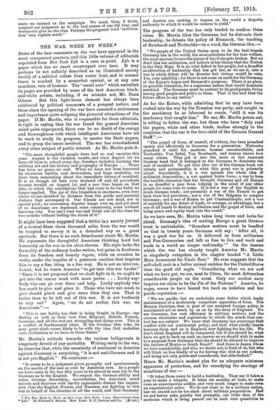BOOKS.
MR. JOHN BUCHAN'S HISTORY OF THE WAR.*
Suenitia, histories of the war are already being published in parts. We cannot undertake to notice there all, but may record a general impression that they are of considerably more value than one would have expected in view of the Censorship and the contradictory nature of much of the information from abroad, whether labelled "official" or otherwise. Perhaps most of us have allowed our annoyance at misleading messages to turn our attention away from the large residuum of facts that are beyond dispute. A final history of the war will nob be possible until, let us say, the memoirs or private papers of the German Emperor, Marshal von Hindenburg, General Joffre, and the Grand Hake Nicholas are published. But meanwhile the histories of the war that are now in the making are worth publishing, if only because they gather together a great amount of raw material which will he useful to later historians. For ourselves, we think they have a present value as books of reference. Such compilations contain, for example, the pertinent State papers, remind us of the dates of important events, and supply us with lists of our own and the enemy's losses by land and sea. These are serious services apart from the pleasure their style, assorted informa- tion, or illustrations may give in their various degrees to many readers. Compilations which provide opinions from every quarter, and offer, so far as such a thing is possible, an impartial view of the war, can be produced only in neutral countries. In passing, we may say that a very good specimen of this class is being published by the New York Times Com- pany under the title The New York Times Current History of the European War (25 cents per volume). It contains con- tributions that would not be available for an English history. If we choose Mr. John Buchan's book from among the other British histories for special notice, it is because it is not a compilation by several hands, but the work of one man, in which there is room for the art of coherence, and which gives the author the opportunity of impressing his personality upon the whole work.
The first volume, which takes us from the beginning of the war to the fall of Namur, promises exceedingly well. After reading it we have, above all things, a sense of the ease of Mr. Buchan's writing. He gives us an account of the political conditions under which the war was born, and if he experienced any difficulty in feeling his way among the thick foga which envelop one of the most sinister international crises on record there is no trace of it in his narrative. The writing is fluent, as the judgments are temperate and sure without ever being cocksure. Mr. Buchan has a swift eye for what is pertinent and what is characteristic. We imagine that the act of choosing gives him no trouble ; what is irrelevant or useless • Nelson's History of She Hac. By John Buchan. With a Preface by the Earl of Bosebery E.G. Vol. I. From the Beginning or the War to the Fall of Namur. Illtietrated with di Maps and Plans. Loudon Thomas Nelson and Sons. [le. net.3 .
for his purpose blows away like the chaff in a threshing machine. To some minds the act of rejection is an acutely painful process—so painful that many men can never induce themselves to set aside material which has been laboriously acquired. The great faith which tells the true historian that no material has been wasted so long as it has guided his judgment, even though it never appear in tangible form, is for such men impossible. Mr. Buchan, we opine, is as little tortured by this disease as any writer could be. His history promises to help and guide all who are in danger of losing sight of the central facts. If it continues on its present scale, it will not be too long for even busy people to read.
Mr. Buchan shows how Germany tried to sap the Triple Entente by her assault on the position of France in Morocco in 1905, by the "shining armour" intervention in 1908, and by the Agadir incident in 1911. Although Germany was successful in coercing Russia in 1908 and iu wringing conces- sions from France in 1911, the Entente remained strong and healthy. Certain events then altered the perspective of German ambitions :—
"The first was the emir which broke out in November 1011 between Italy and Turkey—the former a colleague of Germany's in the Triple Alliance, tho latter the object of German blandish- ment. for a quarter of a century. The Italian annexation of Tripoli and Cyrenaica put an end to German hopes of these terri- tories. Less than a year later the Balkan War began—a war which Germany expected to result in a decisive victory for Turkey. The issue was a final blow to Austria's hopes of a port on the Bgean, and to Germany's dreams of a gradual and painless absorption of the Ottoman Empire. A new and formidable Slav power stood in the way, and behind loomed Russia, the protector of the Slav nations. Such a situation drove Germany to reflect most seriously on her position. She saw the various avenues to world-power, on which she had based her plans, daily closing up. The Near East was shut by the new Slav renaissance; the Far East was too dangerous with Japan at its door; South America was closed to her adventures by the United States, and most of the rest of the world by Britain. Her navy had come to maturity, and was eager to win laurels. She was already the greatest military Power on earth, and ere the Balkan War was over bad increased her total peace strength to 810,000 men. She saw the Triple Entente solidifying into an Alliance, an alliance accompanied by an amazing growth of sympathy and goodwill between the three constituent nations. But at the same time she believed France to be politically precarious, on the verge of a syndicalist revolution ; and the revelation of financial scandals in high places convinced her that the French army had been gao l. toed to the greed of the politicians. The decline in the French birth-rate euggested that in man-power France would show herself conapicuonsly weak. Britain seemed to German observers to be in the thralls of a sentimental socialism. The British nation declined the duty of self-defence, and its favourite political leaders bad showered contempt on the veteran soldier who bad tried to awake his countrymen. The islands were distracted with imminent civil war, and at any moment in Ireland the flames might break through the crust. Above all, British Governments during the past seven years had been toying with peace proposals, and British stateemen had shown themselves singularly averse to facing the probabilities of war."
That, we think, is a very compact description of the world as Germany saw it early last year. Almost every detail in the picture was an incentive to her to be up and doing. The murder of the Austrian heir and his wife at Sarajevo convinced Germany that an opportunity, if not the opportunity, for making war successfully, and with the curiously desiderated appearance of having right on her side, had arrived. Mr. Buchan is not at all immoderate in his conclusion That war was considered by Germany inevitable at no distant date is certain, and the Kaiser seems to have sounded his fellow- monarchs of the Triple Alliance early in the spring. The steps taken by financial houses in America, specially associated with Austrian and German State business, as early as May and June point to a premonition based upon some hint from exalted quarter.. It is highly improbable that Germany bad any inten- tion of forcing a European war by sudden violence on her own part ; but elle believed in the certainty of such a rear, and when the chance offered was not averse to seizing it. At any rate, it is clear that after the murders in Bosnia she set about preparing for what she regarded as the inevitable. German offieere serving abroad were suddenly recalled in the early days of the month ; notion summoning reservists to the colours were printed and sent abroad at the same time ; and the manufacture of certain classes of war manic/ war hurried on. Long before mobilization was announced, or even military law proclaimed, the German army knew what was coming, and while sanguine diplomatists were still striving for peace the Great General Staff bad selected its maps of the future battlefields."
In his second chapter Mr. Buchan briefly describes the man-power, the military systems, and the financial resources of the combatants, as well as the strategical position at the
outbreak of the war. We note that on her Eastern frontier Germany has seventeen lines of railway, whereas Russia has only five—a disparity of which we have once more appreciated the significance within the last few days. Similarly in the Carpathians Austria-Hungary has seven lines piercing the mountains, whereas Russia has only four on her own side. Mr. Buchan's summary of the relative strength of the combatants is worth quoting :— "At the outbreak of war the ultimate man-power of the Allies (excluding Japan) stood to that of the Teutonic League in some such proportion as 23 to 13. The actual armies capable of being put in the field on mobilization stood probably as 13 to 8. Germany was economically the least fitted of the great Powers to stand is long war, and political and strategic conaiderations also pointed to a swift offensive directed against France. In the western theatre of war the proportions of the Allied armies to the German were at the beginning as 4 to T, and of the figure 4 the British Expeditionary Force may be put at 1. The natural policy of the Allies was, therefore, to play for time to give their vast potential resources the chance of coming into action."
Mr. Buchan reduces the early events of the war to their right proportions. The defence of Liege, for all the gallantry of General Leman, did not do more than cheek the vanguard of the German Army. Still, it the magnitude of the affair was exaggerated, its significance was scarcely overstated. Thanks to the heroic staunchness of the hastily assembled Belgian troops, who lacked nearly everything but bravery, it was proved in the first moments of the war that the Germans were not invincible. Mr. Buchan finds that about August 13th there was a change in the German plans. It may have been that the German General Staff was dominated by a passion for punishing the British, and thought it worth while to subordinate everything to gratifying this passion. At all events, more troops were sent in a northerly direction than had been arranged for in the original plan. The notion that the Germans always aim at envelopment has been too readily accepted in England. As Mr. Buchan Bays :- "We may call the idea the dominant coreeption of German strategy in one sense, and one sense only the outflanking of the Allied left gave the beet chance of an immediate and decisive blow. To pierce their line—an equally decisive operation--would have been difficult at any part between Hallett and Meriareas. But it was by no means impossible, since the railways of Belgium; were at Germany's command, to place such a force on her right wing as would crumple up and envelop the Allied flank opposed to it, While the whole German lino advanced, tho vital tark would be that of von }Cluck and von Becton. Elsewhere we shall con- sider the value of Germany's main tactical and strategical per- suasions ; here it is sufficient to noto that the preliminary strategy of the campaign can bo explained far more simply by the exigencies of her position than by any supposed academic preference."
The most unfortunate event described in the present volume is the fall of Namur. General Michel, who held the fortress with the 4th Division of the Belgian Army, gave special atten- tion to his intermediate infantry, thoroughly appreciating the fact that it was the defeat of the Belgian infantry in the intervening spaces of the fortress which hastened the fall of Lidge. But his Intelligence Department was weak, and he does not seem to have been informed of the movements of the Germans on both banks of the Meuse. If General von Emmich sacrificed his German infantry at Lidge before he used his heavy guns, the Germans at Namur intended to make no such mistake. Unfortunately General Michel allowed the enemy to come to close quartets before he attempted to use his division of infantry, and it was then too late. The French, all too busy at Dinant, could not help, and when the Belgians recognized their impotent isolation and fell back it was in dis- ordered haste. No provision had been made for a retreat, and the effect of the collapse of this place, which was the pivot of the Allies defence, was to bring a million men to the verge of disaster. There Mr. Buchan stops, leaving ne with a good appetite for more. In his next volume we shall of course see how the disaster at Namur threatened the Allies with a much worse disaster, and was then averted by the brilliant rally on the Marne.
We cannot do more than mention Lord Rosebery's brief preface to Mr. Buchan's book. Wo will quote only the following sentences
am reluctant to believe in a diabolical and cold-blooded scheme to bring about war at this time; at least, this does not seem to be proved. If war war being planned, it was, I suspect, a longer and a slower match that was burning for a later explosion. And as regards our part in it, one would conjecture that that was, strangely enough, unexpected in Prussia, to judge from tho venomous and insane fury which has raged against us in Germany since we entered on the campaign. We must, then, I think, suspend our judgment as to the real causes of war till time and documents give us the clue. Perhaps the pregnant word 'mobiliza- tion ' may explain much."




































 Previous page
Previous page